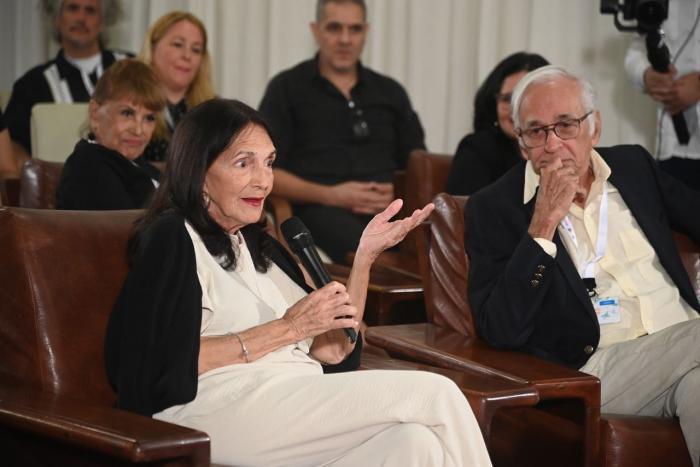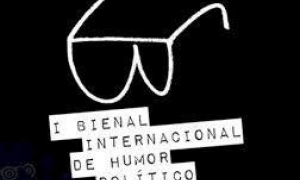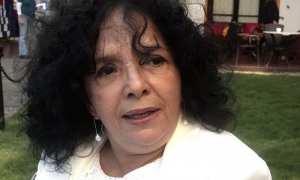The 45th Edition of the New Latin American Film Festival has maintained "the illusion, the hope, and above all has ratified the conviction that we will always have a Latin American film festival," said the First Secretary of the Central Committee of the Communist Party of Cuba and President of the Republic, Miguel Díaz-Canel Bermúdez.
The Head of State held on Tuesday night a meeting with about fifty filmmakers, producers, theoreticians, promoters and other artists and intellectuals linked to the Seventh Art, from the region, the world and Cuba, who participate in the cultural festival that has been held every December in Havana since 1979.
The president wanted to "thank them for the presence" of so many personalities at the event, and to recognize the management and workers of the Cuban Institute of Art and Cinematographic Industry (ICAIC) for their ability to organize it in the midst of the difficult conditions the nation is going through.
"I have not had time these days to watch films, the festival in Cuba is a celebration and we always plan at family level", but these times have been so complicated that we have not been able to do it, said Díaz-Canel to the guests, to whom he explained all the difficulties, natural and otherwise, that Cuba has been suffering.
The meeting, which was attended by Abel Prieto, president of Casas de las Americas, several National Film Awards who attended the first version of the festival in 1979 and other personalities of Cuban culture, was also headed by Alpido Alonso, Minister of Culture, and Alexis Triana, president of ICAIC, who thanked the country's leadership for all the support it has given for the realization of the event.
According to National Film Award winners Manuel Herrera, Mirtha Ibarra and Eslinda Núñez, this has been a very successful festival. In spite of the tremendous restrictions, such as blackouts, transportation problems and everyday problems, the movie theaters have been full, they commented.
Actress Mirtha Ibarra confessed to be "surprised by the enthusiasm, the organization and the massiveness"; "I can't get over my amazement", she stressed. Eslinda Núñez spoke of "a happy, contented public, full halls; people are very happy". We are seeing, she said, "how people enjoy going to the movies, and that fills us with satisfaction and pride.”
Filmmaker Manuel Herrera recalled the emergence of the New Latin American Film Festival. This 45th Edition, he reflected, has taken up the principles of the movement, has injected vitality into this new aesthetic, which has always had to work with few resources.
"The Festival, he insisted, has recovered with its initial function, which is to showcase Latin American cinema, a cinema that is difficult to see in the world, so we can continue to do a lot and we must continue along that path."
CUBA: A MEETING POINT
The exchange between Díaz-Canel and the national and international personalities attending the festival began with comments by Argentine filmmaker Paola Becao, who is participating in the Latin American and Caribbean Animation Forum, an initiative now in its second edition.
We want these forums to continue to be held here, at the Festival, because Cuba, she said, "continues to be a beacon and meeting point for Latin American filmmakers and animation filmmakers."
Esther Hirzel Galarza, director of the ICAIC Animation Studios, which have been operating for more than six decades, commented on the work of this institution, which for the past 20 years has had a new headquarters, promoted by Commander-in-Chief Fidel Castro Ruz, and which has already accumulated more than 1,500 titles, totaling more than 9,000 minutes and which continue to accumulate, despite the strong technological limitations, thanks to its collective.
Ricardo Cuesta, vice president of the Colombian Film Heritage Foundation, commented on the restoration of several Cuban film materials, such as Aventuras de Elpidio Valdés and Elpidio Valdés contra el tren blindado, presented at the festival in the context of the tributes to Frank Padrón.
He expressed his institution's willingness to expand collaboration, based on the latest generation technologies at its disposal, as well as the commitment to continue the recovery of the audiovisual memory of Latin America and the Caribbean, which includes among its axes the links with the New Latin American Cinema Foundation and the International Film School of San Antonio de los Baños.
Filmmaker Adrían Carrazco Zenis, co-director of the Cinemateca de Nicaragua, conveyed to Díaz-Canel greetings from Commander Daniel Ortega and Nicaraguan Vice President Rosario Murillo, and reported on agreements between the Nicaraguan Cinemateca and ICAIC, including the making of the series Martí, Gómez y Maceo, in co-production with several Central American countries.
"Cuba, he pointed out, was fundamental for Nicaraguan cinematography to be born and develop since 1979, and has already accumulated the distinction of ten of its works as UNESCO Intangible Heritage."
Manuel Antonio Villa, president of the Honduran Film Institute, also sent greetings to Díaz-Canel from President Xiomara Castro. He underscored the signing of a memorandum of understanding with ICAIC, and requested support to continue developing his country's cinema, not in resources, but from its experience and training; a support, he explained, from "that Cuban vision that made culture and cinema a State policy."
"Cinema is also a manifestation of the culture of our peoples, of our longings," he commented. And "Cuba, despite its difficulties, has managed to do something that can only be done with experience and commitment".
Carol Rosenberg, president of the American Friends of the Ludwig Foundation, who has directed the Havana Film Festival in New York for the past 25 years, made a special speech.
Established in 2000, this international festival is dedicated to promoting Latin American cinema or films about Latin America and is an example, said Rosenberg, of the relations that can exist between Cuba and the United States even in the worst circumstances. Even, he said, the New York government has recognized this festival as one of its most important cultural events of the year.
Deserved recognition was also offered to the Jordanian-Palestinian filmmaker Darin J. Sella, who brought to the festival her work Farha, screened in the Cinema from Palestine Section, introduced as a sign of solidarity with that brotherly people.
Darin thanked President Diaz-Canel for always being on the side of Palestine. "Thank you for being on the right side of history," he noted. We, he said, share much, such as courage, resilience and many other things among our peoples to resist oppression."
Argentine filmmaker Tristán Bauer, president of the Festival jury, reviewed the long and hard road to emancipation followed by the peoples of Latin America and the Caribbean on the occasion of the bicentennial of the Battle of Ayacucho, and made a "thank you to Cuba from memory and heart", because, he said, "the triumph of the Cuban Revolution was also fundamental for the culture of our peoples", because "Cuba remains a foundational beacon."
TO DEFEND THE FILM FESTIVAL IS TO DEFEND CULTURE
In his closing remarks, Díaz-Canel reiterated his gratitude to the international personalities who participate in the exhibitions, theoretical events and the rest of the activities that take place: "If it were not for the ICAIC work team, the Cuban filmmakers and you, he said, there would have been no festival.
Even if there was a lot of effort, even if there was a lot of will on the part of Cuba, he said, you are part of the concretion of this festival in these hard times, made worse in recent months, although we have already been subjected to great difficulties for four years due to the tightening of the blockade, he reflected.
After commenting that Cuba has the experience and is prepared to face the challenges to come; the bet of our country, he said, is to be able to create more material wealth to distribute with social justice, and it is there, he explained, where the Revolution's defense of culture and the defense of a space like the Festival of New Latin American Cinema also lies.
We, he argued, are determined, and we will achieve it, to have a better economic situation for Cubans, "but if from now on, in times of crisis, we do not work with culture, we do not work to develop a humanist vocation in our people, a spirituality that feeds from culture, that feeds from cinema, when we have material wealth, how will we be different from those who have a lot and distribute it badly?
In the midst of the most complex situations, he further pointed out, we "have to develop this humanism, this feeling of solidarity, emancipating feelings, of cooperation, of collaboration". It is for all this, he added, that "we maintain the Festival of New Latin American Cinema, and we will maintain it."
But it is not the only thing, he added, a month ago we had the International Ballet Festival, we are in the middle of the Havana Biennial, with all the tendencies of the plastic arts, and now this Festival, where all the audiovisual tendencies coincide, where established and young filmmakers share experiences from the debate and harmony, unlike other festivals, where other conceptions, some elitist, predominate.
After stressing that this is a festival that has been loyal to its founders, such as Fidel, García Márquez and Alfredo Guevara, Díaz-Canel asserted that "not even the strongest blockade in the world can prevent us from continuing to be a reference in cinematographic matters, because -he said- in the midst of economic and energy vicissitudes, this event is the proof of the worth of our people."
In Cuba, he reiterated, "there will always be a New Latin American Film Festival, and there will be a festival because there are you, those who visit us, those who also share our ideas, and because there is the ICAIC team, the New Latin American Film Foundation, our Ministry of Culture, our institutions also working in this endeavor. So, long live the New Latin American Film Festival.”







